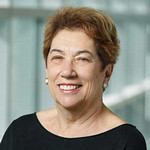We are Responsible for Each Other
June 1, 2015
By Shulamit Reinharz
Editor's note: HBI Director Shulamit Reinharz accepted an Honorary Doctorate of Humane Letters on May 31 from Hebrew College. Here are her acceptance remarks:
Several years ago, I had the privilege of meeting and speaking with the Dalai Lama. At one point he asked me, "Shula, the Jewish people were exiled from their homeland 2,000 years ago, yet they never have forgotten where they came from. My people were exiled from Tibet in 1950 and I fear most of them have already forgotten their origins. How were the Jews able to remember?"
I took a deep breath and answered, "Your Holiness, our secret is that we don't have a Dalai Lama. Instead, each Jew is responsible for all the other Jews."
For me, the operative word here is responsible. In my opinion, an important yet typically unstated aspect of an honorary degree is to confer responsibility upon its recipient. Receiving this honor from Hebrew College led me to think about another familiar message about responsibility: "You are not obligated to complete the task, but neither are you free to desist from it."
This famous saying from Pirkei Avot led me to the question, "Which tasks have I begun that I am responsible to continue?" Here is my 1-1/2 minute answer.
First, I feel responsible to follow the suggestion of Natan Sharansky who said that we should never ask someone to make aliyah, but rather we should make Israel so wonderful that Jews will want to flock there. Through the Hadassah-Brandeis Institute, we have created countless opportunities for researchers, activists and artists to work in Israel.
What else? I feel responsible to remember what Blu Greenberg said when I asked her if there would ever be a female orthodox rabbi. She said, "Where there is a will, there is a halachic way." Anything is possible. I have devoted much of my energy to understanding Jewish women and gender relations in history and to advancing the options for women in Judaism. I am committed to continuing this work for women in general.
And what other task do I need to continue? I remember what my father — a Holocaust survivor — told me, when I asked him shortly before he died, "What is the most important thing you want me to remember about the Holocaust?" He responded, "Remember that there are good people in the world." What he was referring to was the fact that for each person who survived — as he and my mother did — there was at least one good person who helped. In their case, there were many good people who risked their lives to save my parents. I view it as my responsibility to write a book about my father, sharing this message. And I have started.
And what's the final item on my current to-do list? Both my mother and father received graduate degrees in Hebrew language and literature. Their love of the Hebrew language is something they passed on to me. As my friend and chavruta partner, Chabad Shaliach Peretz Chein told me, "If Hebrew withers, we will lose touch with the Torah, and it will be difficult to sustain ourselves as the Jewish people." I have tried hard to master the language, to give my children a Hebrew education, and through various initiatives to encourage American Jews to learn Hebrew.
So, I thank Hebrew College, and particularly its president, Rabbi Danny Lehman and the Hebrew College board, for this honor with its implicit message — I may have taken the first steps, but my work is not done. Todah rabah.
 Shulamit Reinharz, founder and director of the Hadassah-Brandeis Institute, is the Jacob Potofsky Professor of Sociology and director of the Women's Studies Research Center.
Shulamit Reinharz, founder and director of the Hadassah-Brandeis Institute, is the Jacob Potofsky Professor of Sociology and director of the Women's Studies Research Center.